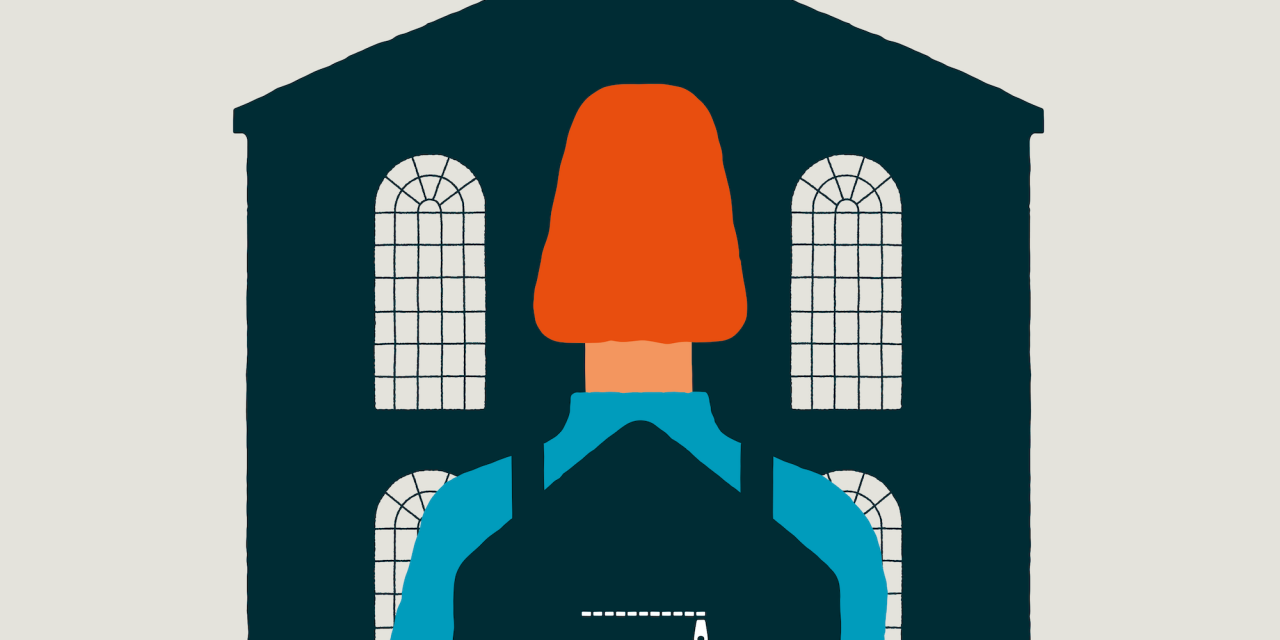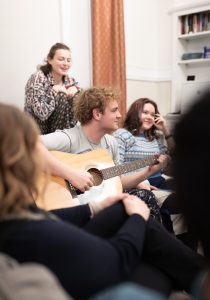
A Home Away from Home

For Milton’s boarding students, residential life faculty create a strong sense of community.
Story by Marisa Donelan
Illustration by Martin Leon Barreto
Photography by Evan Scales ’17
Melissa Figueroa laughs when she remembers her daughter standing on a table in Forbes House, demanding payment for the Girl Scout cookies the older kids had ordered from her. The six-year-old was full of confidence.
“When we moved here, my daughter was four and my son was seven, and they loved it because they felt like they had all these brothers who looked out for them and included them,” says Figueroa, who has lived on campus for ten years and led Forbes as house head for seven. “For my daughter especially, it’s given her incredible skills to be able to talk to older kids. I think a lot of their strengths have come from being part of this community.”
Each of Milton’s nine houses— Goodwin, Hathaway, Forbes, Robbins, Wolcott, Norris, Hallowell, Millet, and Academy—has its own personality and traditions and operates a little differently. All of them claim committed house staff, faculty members who supervise the students, plan activities, and build community within these homes away from home. The faculty involved in the boarding program take an “all hands on deck” approach to caring for students—dedicating time to making sure students are supported in their classes, activities, and social development. Many of the faculty live in the dorms with their families; other faculty who live on campus are affiliated with individual dorms.
Half of the Upper School’s more than 700 students live on campus; in 2023, boarders came from 26 states and 31 countries, places as close as Massachusetts and far away as Korea, Malawi, and Finland. Each student brings something unique to their dorm communities and their affiliation with and affection for their dorms and housemates is often lifelong.
“The kids that are part of Forbes House, no matter their interests around campus or where they come from, have this bond,” says Figueroa. “They feel like they’re part of something bigger than themselves because of the community and because they’re part of a legacy that lasts beyond their time at Milton.”
Melvin Joseph ’24, one of two boarding monitors—student government leaders who represent the boarding community at large—says he loves spending time with the Norris House faculty, their families, and even their pets. “It feels like you’re part of one big family,” he says. The faculty make a dedicated effort to build a sense of belonging within the dorm, he says.
In Norris, house head Mark Goodrich works with the seniors and house council members to plan fun activities. Events like the Norris Games, where the entire dorm is split into teams to compete in everything from soccer to cup-stacking, are fun because everyone gets into the friendly competition, Joseph says.
Activities like dorm dodgeball, sit-down dinners, off-campus trips, trick-or-treating at Halloween, and other holiday traditions help keep continuity of dorm culture at Milton. Most Milton students remain in the same house through their entire stay in the Upper School, which helps to preserve favorite traditions. The students notice and appreciate moments when the faculty go the extra mile for them, Joseph says. On Family Weekend, for example, when many of the Norris residents left to spend time with visiting family members, the Norris staff had a special barbecue dinner with the students who remained.
“Sharing the meal together was fun, and it was especially nice to see just how much my dorm parents cared about fostering belonging in the dorm, even with most of the students signed out and off campus that weekend,” Joseph says.
“All of the faculty, both residential and not, pay attention to us and how we’re doing, and they make a big effort to remind us of the community we have here,” says Maya Spektorov ’24, a senior in Hathaway House and boarding monitor with Joseph. “When I was going through a hard time junior year, I came downstairs one night and was surprised with a Harry Potter movie night—my favorite—and tons of snacks. A bunch of the girls were there, as well as the faculty who had noticed that I’d been off for a few days, and we just spent the night having fun.”
One evening this past November in Academy House, boarding students and faculty gathered around the common room table with to-go containers from the dining hall. Over chicken tikka masala, they caught up with the highlights of their recent fall break, gently joked with one another, and made plans for an upcoming weekend trip to Coolidge Corner.
“It’s very much like a family,” says house head Tori Lockwood of Milton’s newest dorm. “Everything we do is as a group, and the students are all involved in every community decision.”
Academy House, Milton’s all-gender dorm, opened in 2022. The newness of the dorm gives each resident a voice in establishing community norms and traditions, and Lockwood finds that involving each student is empowering.

Students enjoy some down time in the Academy House common room.
“I really enjoy the moments where we’re all together, just sitting around and chatting and being goofy,” Lockwood says.
In the Wolcott House common room, a pool table and a large flat-screen television hooked up to a PlayStation 5 are the main gathering spots amid the dark wood paneling and sepia-toned photos of past Wolcott residents. The spirit of togetherness starts at the very beginning of the year, says Josh Jordan ’11, Wolcott’s house head.
“In our opening meetings, the kids who are leaders in the house talk about what it was like for them when they were new to Milton,” Jordan says. “Having them be vulnerable in a group setting like that, which is very brave, draws in some of our younger kids who may be feeling homesick or overwhelmed.” “It’s home and it should feel like home,” he says of the dorm. Wolcott is the largest of Milton’s dorms, with 46 students from all over the world, who are involved in activities across the school. It’s helpful to have a residential staff that is tapped into each student’s interests, academic progress, and social and emotional wellness, Jordan says.
“The students have some autonomy to figure out when they’re hanging out with friends and when they’re studying, and we help them if that balance isn’t quite right,” he says. “At the same time, we want them to get into the habit of being able to think for themselves and to make decisions for themselves—healthy decisions, smart decisions. We support them as they grow.”
Presence and quality time from the dorm faculty members is invaluable in creating a welcoming atmosphere, says Anika Walker-Johnson, the school’s director of residential life.
“There’s nothing more special than walking into a house and seeing a house parent playing a game of pool or engaging in conversation with students,” Walker-John- son says. “It’s in the effort to build those relationships, so that the students know you’re there for them, you see them, and you care about their lives.”
At Milton, Walker-Johnson has observed, care for students extends beyond the official residential faculty members. Staff who interact with boarding students regularly—from dining services to the bookstore to campus safety—get to know them well, learning not just their names but their stories. And they can tell when a student is having a tough time, adding a layer to the safety net already in place for students through the dorm faculty.
“We see the adults caring for the students in the way that parents would, not just in moments of celebration, but at times when the students need to be corrected in some way, or when they’re walking down a path that isn’t healthy,” she says. “If that doesn’t feel like home, I don’t know what does.”




